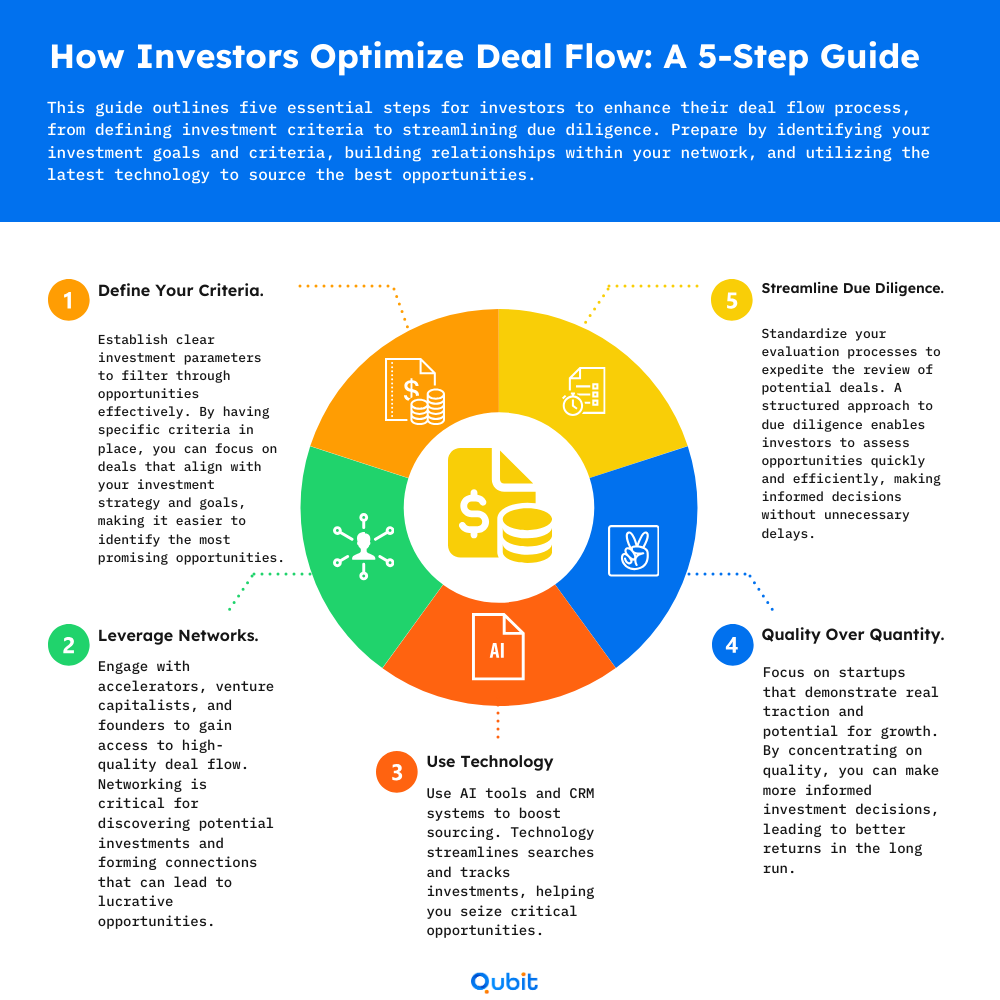A well-managed deal flow enhances both the quantity and quality of your investment opportunities. It allows you to identify high-potential startups early and gain a competitive edge. Yet, many investors face challenges in optimizing their deal flow due to complex processes and the ever-changing dynamics of the startup ecosystem. In this guide, we’ll explore strategies to refine your deal flow. We’ll discuss the importance of leveraging networks and utilizing technology. Additionally, we’ll cover best practices that can enhance your approach. Together, these insights aim to elevate your investment success.

Why Startup Investment Deal Flow Matters
Demystifying Deal Flow in Venture Capital
In venture capital, deal flow refers to the rate at which investment opportunities are presented to investors. Think of it as the lifeblood of investment firms. A healthy deal flow ensures a consistent stream of startups to evaluate. It increases your chances of finding ventures that align with your investment criteria and growth objectives. However, deal flow isn’t just about the number of opportunities—it’s about quality. A pipeline filled with unsuitable or low-potential startups can drain resources and obscure valuable opportunities.How Effective Deal Flow Management Boosts Your Investment Success
Managing your deal flow effectively can significantly enhance your investment outcomes by:- Increasing Access to Opportunities: Expanding your network taps into a larger pool of potential investments, boosting the likelihood of discovering exceptional startups.
- Improving Decision-Making: A systematic approach provides better data for evaluating startups, enabling informed decisions based on comprehensive analyses.
- Enhancing Returns: Identifying high-potential startups early often leads to more favorable investment terms and higher returns on investment.
How to Segment Your Deal Flow for Better Results
Startups thrive when they effectively segment their deal flow to align with their investment goals. Proper categorization of deal flow sources leads to better prioritization and higher-quality outcomes.The 4 Types of Deal Flow and How to Leverage Them
- Actively Sourced Deal Flow
- Proactive Research and Outreach: Seek opportunities by networking, attending industry events, and reaching out to startups that fit your investment thesis.
- Example: Targeting startups in emerging tech sectors like artificial intelligence or renewable energy.
- Endorsed Deal Flow
- Referrals from Trusted Connections: Receive opportunities through recommendations from your network.
- Example: Recommendations from fellow investors or executives from your portfolio companies.
- Passive Deal Flow
- Unsolicited Opportunities: Startups approach you without direct outreach.
- Example: Entrepreneurs contacting you through your website or social media channels.
- Automated Deal Flow
- Technology-Driven Sourcing: Use algorithms and data analytics to identify potential investments.
- Example: AI algorithms scanning databases to find startups meeting specific criteria.
Prioritize Your Deal Flow Segments for Maximum Impact
To optimize your deal flow:- Assess Alignment: Ensure opportunities align with your investment criteria, sector focus, and stage preferences.
- Evaluate Source Credibility: Prioritize referrals from trusted networks, as they often yield higher-quality deals.
- Allocate Resources Wisely: Focus time and resources on segments that historically provide the best returns.
Boosting Your Deal Flow Through Strategic Networking
Building Powerful Relationships to Enhance Deal Flow
- Collaborate with Other Investors: Share insights and co-invest in promising startups. Forming syndicates allows pooling resources for larger deals.
- Engage with Portfolio Companies: Leverage the networks of startups you’ve invested in. They can provide valuable referrals and insights into emerging ventures.
- Connect with Service Providers: Build relationships with lawyers, accountants, and consultants who work with startups. They often know when startups are seeking capital before it’s public knowledge.
How to Engage with Accelerators, Incubators, and Universities to Access Top Startups
- Participate in Programs: Engage with accelerators and incubators to access early-stage startups and innovative ideas.
- Host Workshops and Mentorships: Provide value to the startup community, building credibility and increasing visibility.
Advanced Networking Techniques for Investors
- Personalized Outreach: Tailor your interactions based on individual preferences and needs to strengthen relationships.
- **Understanding Investor Psychology: Recognize motivations and decision-making processes to enhance negotiation strategies and collaborations.
How Do Investors Find Deal Flow?
- Networking with Industry Professionals
- Attending Events and Conferences
- Partnerships with Accelerators and Incubators
- Utilizing Online Platforms and Deal Flow Tools
Using Technology and Data to Optimize Deal Flow
In the digital age, technology plays a pivotal role in optimizing deal flow. Harnessing data analytics and emerging technologies can streamline processes and give you a competitive edge.Using Data Analytics to Enhance Deal Flow Management
- Data-Driven Decision Making: Utilize analytics to assess startups thoroughly, evaluating metrics like market size, growth rates, and financial projections.
- Identifying Trends Early: Analyze data to spot emerging sectors, allowing you to invest ahead of the curve.
How AI and Machine Learning Transform Deal Sourcing
- Automate Sourcing with AI: Implement AI algorithms to identify startups that match your investment criteria.
- Predictive Analysis: Use machine learning models to forecast startup success probabilities based on historical data.
Top Deal Flow Management Tools and Platforms
- CRM Systems: Centralize data, track interactions, and manage communications efficiently.
- Deal Management Software: Utilize specialized platforms designed for investment deal flow management.
Implement Emerging Technologies to Stay Ahead
- Blockchain for Transparency: Enhance security and trust in transactions with immutable records and smart contracts.
- AI Integration: Improve data analysis and decision-making processes with advanced AI capabilities.
Engage with the Startup Ecosystem to Expand Your Deal Flow
Active engagement with the startup ecosystem keeps you connected with innovative ventures and industry developments.Participate in Accelerators and Incubators
- Mentorship Opportunities: Guide startups and gain early access to potential investments.
- Invest in Cohorts: Support multiple ventures and diversify your portfolio.
Form Corporate Partnerships
- Collaborate with Established Companies: Access innovation initiatives and networks through partnerships.
- Joint Ventures: Combine resources and expertise for unique investment opportunities.
Establish Thought Leadership
- Publish Industry Insights: Share analyses and perspectives to establish authority and credibility.
- Host Events: Organize conferences or meetups to connect with industry leaders and emerging startups.
Strategies for Effective Ecosystem Engagement
- Active Involvement: Attend industry events, webinars, and workshops to stay visible and informed.
- Build Community: Contribute to discussions, support initiatives, and collaborate on projects to foster relationships.
Implementing Best Practices in Deal Flow Management
Establishing best practices ensures you handle opportunities efficiently and effectively.Automate Processes for Efficiency
- Use CRM Systems: Streamline data collection and manage startup interactions in one platform.
- Automate Communications: Set up automated follow-ups to maintain engagement with potential investments.
Collect and Analyze Valuable Information
- Standardize Data Capture: Use consistent evaluation metrics to compare startups fairly.
- Track Performance: Monitor past investments to inform future decisions and refine criteria.
Focus on Quality Over Quantity
- Align with Investment Criteria: Prioritize startups that fit your specific goals.
- Conduct Deep Evaluations: Invest time in thoroughly assessing high-potential startups.
Establish Efficient Workflows
- Define Clear Processes: Outline steps from sourcing to investment to reduce ambiguity.
- Allocate Responsibilities: Assign roles within your team for streamlined operations.
Adopt Continuous Improvement Strategies
- Regularly Review Processes: Assess and adjust your deal flow strategies as needed.
- Stay Updated on Industry Changes: Keep informed about technological advancements and evolving best practices.
Ensuring Success: The Importance of Due Diligence in Deal Flow
Key Aspects of Due Diligence
- Financial Analysis: Review financial statements, revenue models, and projections for sustainability.
- Market Assessment: Analyze market size, competition, and growth potential to ensure significant opportunities.
- Legal Compliance: Verify adherence to legal and regulatory requirements, including intellectual property rights.
- Management Evaluation: Assess the experience and capabilities of the founding team.
Adopt Advanced Strategies and Stay Ahead of Emerging Trends
Staying ahead requires adopting advanced strategies and keeping abreast of emerging trends.Personalization Techniques in Deal Sourcing
- Customized Outreach: Tailor communications to address specific startup needs, increasing engagement.
- Build Long-Term Relationships: Focus on ongoing connections rather than one-off interactions.
Understanding Investor Psychology
- Recognize Emotional Factors: Be aware of biases and preferences that influence decision-making.
- Align with Decision Processes: Present data and narratives that resonate with investors’ values and goals.
Manage Cultural Considerations in International Investments
- Cultural Awareness: Understand local business practices and societal norms when exploring international markets.
- Regulatory Compliance: Stay informed about international laws and regulatory environments.
Embrace the Impact of Emerging Technologies
- Leverage AI Advancements: Utilize sophisticated predictive analytics and AI-driven matchmaking.
- Utilize Blockchain Applications: Enhance security and trust with immutable records and smart contracts.
The Next Steps
Building a strong deal flow pipeline is essential for success in startup investments. You can capitalize on the most promising investment opportunities by:- Segmenting Deal Flow: Prioritizing high-quality sources that align with your goals.
- Leveraging Networks: Using relationships to access exclusive opportunities.
- Utilizing Technology: Implementing data analytics and AI to enhance sourcing and evaluation.
- Engaging with the Ecosystem: Actively participating in the startup community.
- Implementing Best Practices: Streamlining processes for efficiency and effectiveness.
Take Action Now
Apply these strategies and stay ahead of emerging trends to build a robust deal flow pipeline. Continuous refinement and staying informed are key to long-term success. Remember, the startup investment landscape is always evolving. Adaptability and proactive strategies are essential.Additional Resources
- Startup Matchmaking guide offers deeper insights into connecting with the right ventures.
- Contact Us: Discover how Qubit Capital can support your investment journey. Our team is dedicated to helping you navigate the complex landscape of startup investments.
Key Takeaways
- Focus on Quality Deal Flow: Prioritize high-quality opportunities that align with your investment criteria to enhance success.
- Leverage Networks Strategically: Build and nurture relationships to access exclusive and endorsed deal flow.
- Utilize Technology and Data Analytics: Implement AI and data-driven tools to optimize sourcing and evaluation processes.
- Engage Actively with the Startup Ecosystem: Participate in accelerators, incubators, and industry events to stay connected with innovation.
- Implement Best Practices for Efficiency: Automate processes and establish clear workflows to manage deal flow effectively.
- Conduct Thorough Due Diligence: Perform comprehensive evaluations to mitigate risks and make informed decisions.
- Stay Adaptive to Emerging Trends: Adopt advanced strategies and embrace new technologies to maintain a competitive edge.
Frequently asked Questions
What Are the Best Strategies for Startup Deal Flow?
- Build Professional Networks: Collaborate with investors, entrepreneurs, and industry professionals.
- Use Technology and Data Analytics: Leverage tools that automate sourcing and provide insights.
- Engage with the Startup Ecosystem: Participate in accelerators, incubators, and events.
- Prioritize High-Quality Sources: Focus on deal flow segments that align with your goals.
- Implement Efficient Processes: Streamline workflows and continuously improve strategies.


 Back
Back



